【英语】高考英语阅读理解(科普环保)技巧(很有用)及练习题
【英语】高三英语阅读理解(科普环保)解题技巧讲解及练习题(含答案)含解析
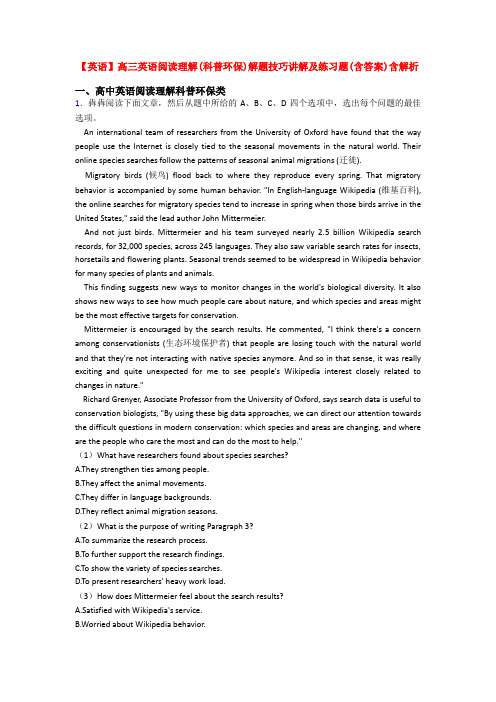
【英语】高三英语阅读理解(科普环保)解题技巧讲解及练习题(含答案)含解析一、高中英语阅读理解科普环保类1.犇犇阅读下面文章,然后从题中所给的A、B、C、D四个选项中,选出每个问题的最佳选项。
An international team of researchers from the University of Oxford have found that the way people use the Internet is closely tied to the seasonal movements in the natural world. Their online species searches follow the patterns of seasonal animal migrations (迁徙).Migratory birds (候鸟) flood back to where they reproduce every spring. That migratory behavior is accompanied by some human behavior. "In English-language Wikipedia (维基百科), the online searches for migratory species tend to increase in spring when those birds arrive in the United States," said the lead author John Mittermeier.And not just birds. Mittermeier and his team surveyed nearly 2.5 billion Wikipedia search records, for 32,000 species, across 245 languages. They also saw variable search rates for insects, horsetails and flowering plants. Seasonal trends seemed to be widespread in Wikipedia behavior for many species of plants and animals.This finding suggests new ways to monitor changes in the world's biological diversity. It also shows new ways to see how much people care about nature, and which species and areas might be the most effective targets for conservation.Mittermeier is encouraged by the search results. He commented, "I think there's a concern among conservationists (生态环境保护者) that people are losing touch with the natural world and that they're not interacting with native species anymore. And so in that sense, it was really exciting and quite unexpected for me to see people's Wikipedia interest closely related to changes in nature."Richard Grenyer, Associate Professor from the University of Oxford, says search data is useful to conservation biologists, "By using these big data approaches, we can direct our attention towards the difficult questions in modern conservation: which species and areas are changing, and where are the people who care the most and can do the most to help."(1)What have researchers found about species searches?A.They strengthen ties among people.B.They affect the animal movements.C.They differ in language backgrounds.D.They reflect animal migration seasons.(2)What is the purpose of writing Paragraph 3?A.To summarize the research process.B.To further support the research findings.C.To show the variety of species searches.D.To present researchers' heavy work load.(3)How does Mittermeier feel about the search results?A.Satisfied with Wikipedia's service.B.Worried about Wikipedia behavior.C.Amazed at people's care about nature.D.Sad about people's not getting close to nature.(4)Why does Richard think such search data is useful?A.It helps to aim at conservation targets.B.It increases interest in big data approaches.C.It keeps track of trends in biologists' work.D.It pushes people to solve difficult problems.【答案】(1)D(2)B(3)C(4)A【解析】【分析】本文是一篇说明文,牛津大学的一个国际研究小组发现,人们使用互联网的方式与自然界的季节性运动密切相关。
(英语)高考英语阅读理解(科普环保)解题技巧及练习题(含答案)

(英语)高考英语阅读理解(科普环保)解题技巧及练习题(含答案)一、高中英语阅读理解科普环保类1.犇犇阅读下列短文,从每题所给的A、B、C和D四个选项中,选出最佳选项。
A team of international scientists is due to set off for the world's biggest iceberg in a mission aiming to answer fundamental questions about the impact of climate change in the polar regions. The scientists, led by the British Antarctic Survey (BAS), are trying to reach a newly revealed ecosystem that had been hidden for 120,000 years below the Larsen C ice shelf.Last year, part of the Larsen C ice shelf calved (崩解) away, forming a huge iceberg-A68—which is four times bigger than London, and revealing life beneath for the first time. Now scientists say it is a race against time to explore these new ecosystems before they are transformed to the light. Marine biologist Dr Katrin Linse from the BAS is leading the mission."The calving of A68 provides us with a unique opportunity to study marine life as it responds to a huge environment change," she said. "It is important that we get there quickly before the undersea environment changes as sunlight enters the water."Professor David Vaughan, science director at the BAs, said, "We need to be bold (大胆的) on this one. Larsen C is a long way south and there's lots of sea ice in the area, but this is important science, so we will try our best to get the team where they need to be. He said climate change had already affected the sea around Antarctica and is warming some coastal waters. "Future warming may make some habitats warm. Where these habitats support unique species that are adapted to love the cold and not the warm, those species are going to either move or die."There is growing concern about the possible impact of climate change in the Antarctic. Earlier this month, a report revealed that melting ice sheets in Greenland and Antarctica are speeding up the already fast pace of the sea level rise. The research, published by the National Academies of Science, Engineering and Medicine, said, "At the current rate, the world's ocean will be, on average, at least 60cm higher by the end of the century." However, it found that the process is accelerating, and more than three quarters of the acceleration since 1993 is due to melting ice sheets in Greenland and Antarctica, the study shows.(1)Why are the scientists eager to go to the iceberg?A. To study how the iceberg was formed.B. To study a newly discovered ecosystem.C. To explore a new way to prevent climate change.D. To explore the geography of the Larsen C ice shelf.(2)What do the underlined words "this one" in the fourth paragraph refer to?A. The Larsen C ice shelf.B. Climate change in Antarctica.C. The A68 iceberg with the ecosystem beneath it.D. The condition of animal species in Antarctica.(3)What can we learn about the A68 iceberg from the text?A. It is as big as London.B. It is part of an ice shelf in the Arctic.C. It will disappear in a very short time.D. It has uncovered an unknown ecosystem in Antarctica.(4)What can we infer from the last paragraph?A. There is no need to worry about climate change in Antarctica.B. The ice sheets in Greenland and Antarctica are melting at a steady rate.C. Many creatures living in deep water will die out due to climate change.D. By 2100, the sea level will have risen to a much higher level than now.【答案】(1)B(2)C(3)D(4)D【解析】【分析】本文是一篇说明文,南极地区的拉森C冰架崩解形成了一座巨大的冰山A68 iceberg。
【英语】高考英语阅读理解(科普环保)解题技巧及练习题(含答案)
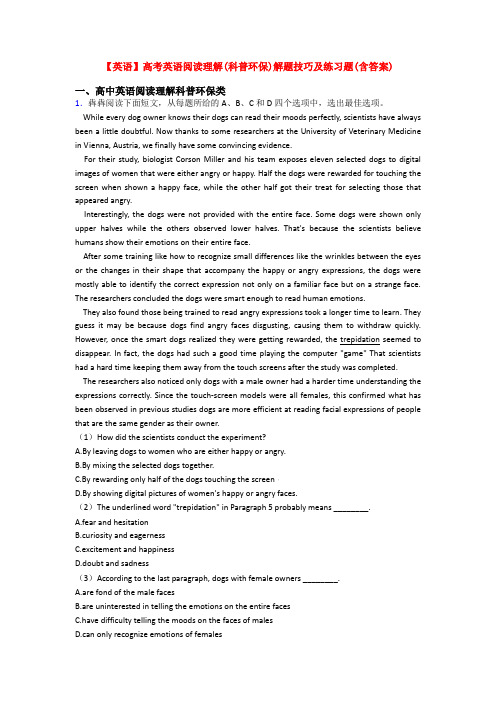
【英语】高考英语阅读理解(科普环保)解题技巧及练习题(含答案)一、高中英语阅读理解科普环保类1.犇犇阅读下面短文,从每题所给的A、B、C和D四个选项中,选出最佳选项。
While every dog owner knows their dogs can read their moods perfectly, scientists have always been a little doubtful. Now thanks to some researchers at the University of Veterinary Medicine in Vienna, Austria, we finally have some convincing evidence.For their study, biologist Corson Miller and his team exposes eleven selected dogs to digital images of women that were either angry or happy. Half the dogs were rewarded for touching the screen when shown a happy face, while the other half got their treat for selecting those that appeared angry.Interestingly, the dogs were not provided with the entire face. Some dogs were shown only upper halves while the others observed lower halves. That's because the scientists believe humans show their emotions on their entire face.After some training like how to recognize small differences like the wrinkles between the eyes or the changes in their shape that accompany the happy or angry expressions, the dogs were mostly able to identify the correct expression not only on a familiar face but on a strange face. The researchers concluded the dogs were smart enough to read human emotions.They also found those being trained to read angry expressions took a longer time to learn. They guess it may be because dogs find angry faces disgusting, causing them to withdraw quickly. However, once the smart dogs realized they were getting rewarded, the trepidation seemed to disappear. In fact, the dogs had such a good time playing the computer "game" That scientists had a hard time keeping them away from the touch screens after the study was completed.The researchers also noticed only dogs with a male owner had a harder time understanding the expressions correctly. Since the touch-screen models were all females, this confirmed what has been observed in previous studies dogs are more efficient at reading facial expressions of people that are the same gender as their owner.(1)How did the scientists conduct the experiment?A.By leaving dogs to women who are either happy or angry.B.By mixing the selected dogs together.C.By rewarding only half of the dogs touching the screenD.By showing digital pictures of women's happy or angry faces.(2)The underlined word "trepidation" in Paragraph 5 probably means ________.A.fear and hesitationB.curiosity and eagernessC.excitement and happinessD.doubt and sadness(3)According to the last paragraph, dogs with female owners ________.A.are fond of the male facesB.are uninterested in telling the emotions on the entire facesC.have difficulty telling the moods on the faces of malesD.can only recognize emotions of females(4)What is the best title for this passage?A.Mood Changes Influence DogsB.Dogs Identify the MoodsC.dogs and Their OwnersD.Dog's Mood Research【答案】(1)D(2)A(3)C(4)B【解析】【分析】本文是一篇说明文,最新的实验发现,即狗能够识别人的面部表情的变化。
【英语】高考必备英语阅读理解(科普环保)技巧全解及练习题(含答案)

【英语】高考必备英语阅读理解(科普环保)技巧全解及练习题(含答案)一、高中英语阅读理解科普环保类1.犇犇阅读下列短文,从每题所给的A、B、C、D四个选项中,选出最佳选项。
Against the supposition that forest fires in Alaska, Canada and Siberia warm the climate, scientists have discovered that cooling may occur in areas where burnt trees allow more snow to mirror more sunlight into space.This finding suggests that taking steps to prevent northern forest to limit the release of greenhouse gases may warm the climate in northern regions. Usually large fires destroyed forestsin these areas over the past decade. Scientists predict that with climate warming, fires may occur more frequently over next several centuries as a result of a longer fire season. Sunlight taken inby the earth tends to cause warming, while heat mirrored back into space tends to cause cooling.This is the first study to analyze all aspects of how northern fires influence climate. Earlier studies by other scientists have suggested that fire in northern regions speed up climate warming because greenhouse gases from burning trees and plants are released into the atmosphere and thus trap heat.Scientists found that right after the fire, large amounts of greenhouse gases entered the atmosphere and caused warming. Ozone (臭氧) levels increased, and ash from the fire fell on far-off sea ice, darkening the surface and causing more radiation from the sun to be taken in. The following spring, however, the land within the area of the fire was brighter than before the fire, because fewer trees covered the ground. Snow on the ground mirrored more sunlight back into space, leading to cooling."We need to find out all possible ways to reduce the growth of greenhouse gases in the atmosphere." Scientists tracked the change in amount of radiation entering and leaving the climate system as a result of the fire, and found a measurement closely related to the global air temperature. Typically, fire in northern regions occurs in the same area every 80 to 150 years. Scientists, however, found that when fire occurs more frequently, more radiation is lost from the earth and cooling results. Specifically, they determined when fire returns 20 years earlier than predicated, 0.5 watts per square meter of area burned are soaked up by the earth from greenhouse gases, but 0.9 watts per square meter will be sent back into space. The net effect is cooling. Watts are used to measure the rate at which energy is gained or lost from the earth.(1)According to the new findings, taking steps to prevent northern forest fires may ________.A. result in a warming climateB. cause the forest fires to occur more frequentlyC. lead to a longer fire seasonD. protect the forests and the environment there(2)The following are all the immediate effects after a forest fire EXCEPT ________.A. large amounts of greenhouse gases enter the atmosphereB. the levels of ozone which is a type of oxygen increaseC. snow on the ground mirrors more sunlight back into spaceD. ashes from the fire fall on the ice surface and take in more radiation from the sun(3)Earlier studies about northern forest fires ________.A. analyze all aspects of how northern fires influence climateB. indicate that forest fires will pollute the atmosphereC. suggest that people should take measures to protect the environmentD. suggest that the fires will speed up climate warming(4)The underlined phrase "soak up" in the last paragraph most probably means ________.A. releasedB. absorbedC. createdD. distributed(5)From the passage we can draw a conclusion that forest fires in Alaska, Canada and Siberia may ________.A. warm the climate as the supposition goesB. allow more snow to reflect more sunlight into space and thus cool the climateC. destroy large areas of forests and pollute the far-off sea iceD. help to gain more energy rather than release more energy【答案】(1)A(2)C(3)D(4)B(5)B【解析】【分析】本文是一篇说明文,介绍了阿拉斯加、加拿大和西伯利亚的森林大火使气候变暖,科学家们已经发现,在燃烧的树木允许更多的雪将更多的阳光反射到太空的地区可能会发生冷却。
【英语】高考必备英语阅读理解(科普环保)技巧全解及练习题(含答案)

【英语】高考必备英语阅读理解(科普环保)技巧全解及练习题(含答案)一、高中英语阅读理解科普环保类1.犇犇Choose the one that fits best according to the information given in the passage you have just read.Escaping predators(食肉动物), digestion and other animal activities—including those of humans—require oxygen. But that essential ingredient is no longer so easy for marine life to obtain, several new studies reveal.In the past decade ocean oxygen levels have taken a dive—an alarming trend that is linked to climate change, says Andreas Oschlies, an oceanographer at the Helmholtz Center for Ocean Research in Germany, whose team tracks ocean oxygen levels worldwide. "We were surprised by the intensity of the changes we saw, how rapidly oxygen is going down in the ocean and how large the effects on marine ecosystems are," he says. It is no surprise to scientists that warming oceans are losing oxygen, but the scale of the drop calls for urgent attention. Oxygen levels in some tropical (热带的) regions have dropped by an astonishing 40 percent in the last 50 years, some recent studies reveal. Levels have dropped less significantly elsewhere, with an average loss of 2 percent globally.A warming ocean loses oxygen for two reasons: First, the warmer a liquid becomes, the less gas it can hold. That is why carbonated drinks go flat faster when left in the sun. Second, as polar sea ice melts, it forms a layer of water above colder, more salty sea waters. This process creates a sort of lid that can keep currents from mixing surface water down to deeper depths. And because all oxygen enters the surface, less mixing means less of it at depth.Ocean animals large and small, however, respond to even slight changes in oxygen by seeking refuge in higher oxygen zones or by adjusting behavior, Oschlies and others in his field have found. These adjustments can expose animals to new predators or force them into food-scarce regions. Climate change already poses serious problems for marine life, such as ocean acidification, but deoxygenation is the most pressing issue facing sea animals today, Oschlies says. After all, he says, "they all have to breathe."Aside from food web problems, animals face various other physiological challenges as their bodies adjust to lower oxygen levels. Chinese shrimp(虾) move their tails less vigorously to preserve energy in lower oxygen environments. Some creatures, such as jellyfishes, are more tolerant of low oxygen than others are. But all animals will feel the impact of deoxygenation because they all have evolved their oxygen capacity for a reason, says Oschlies. "Any drop in oxygen is going to damage survivability and performance," he says.(1)According to the first two paragraphs, what worries scientists the most?A. The worsening deoxygenation in the warming ocean.B. The survival of predators and various marine animals.C. The alarmingly changeable oxygen levels in the ocean.D. The lack of attention to the warming of tropical oceans.(2)Which of the following is a reason for the oxygen loss in the ocean?A. Polar ice melting consumes much oxygen in the ocean.B. Global warming reduces the amount of oxygen in the air.C. The surface polar ice water prevents oxygen going down.D. Salty water holds less gas in the increasingly warmer ocean.(3)What can be inferred from the passage?A. Ocean deoxygenation changes some animals' natural territories.B. Ocean acidification is more serious a problem than deoxygenation.C. Not all ocean animals are bothered by the decreasing oxygen levels.D. Some animals reduce their movements in order to absorb more oxygen.(4)Which of the following is the best title of the passage?A. The Oxygen Levels of Marine LifeB. Ocean Warming Affects Food WebC. The Survivability of Ocean AnimalsD. The Ocean Is Running Out of Breath【答案】(1)A(2)C(3)A(4)D【解析】【分析】本文是一篇说明文,介绍了海洋氧含量下降是一个与气候变化有关的令人担忧的趋势。
【英语】高考英语阅读理解(科普环保)技巧和方法完整版及练习题
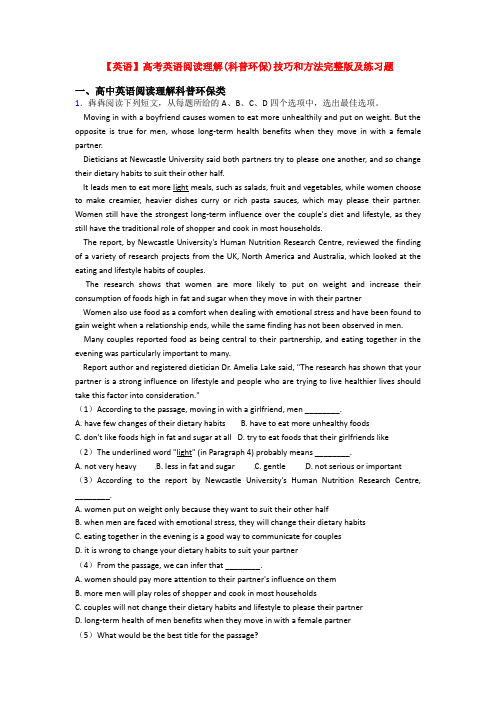
【英语】高考英语阅读理解(科普环保)技巧和方法完整版及练习题一、高中英语阅读理解科普环保类1.犇犇阅读下列短文,从每题所给的A、B、C、D四个选项中,选出最佳选项。
Moving in with a boyfriend causes women to eat more unhealthily and put on weight. But the opposite is true for men, whose long-term health benefits when they move in with a female partner.Dieticians at Newcastle University said both partners try to please one another, and so change their dietary habits to suit their other half.It leads men to eat more light meals, such as salads, fruit and vegetables, while women choose to make creamier, heavier dishes curry or rich pasta sauces, which may please their partner. Women still have the strongest long-term influence over the couple's diet and lifestyle, as they still have the traditional role of shopper and cook in most households.The report, by Newcastle University's Human Nutrition Research Centre, reviewed the finding of a variety of research projects from the UK, North America and Australia, which looked at the eating and lifestyle habits of couples.The research shows that women are more likely to put on weight and increase their consumption of foods high in fat and sugar when they move in with their partnerWomen also use food as a comfort when dealing with emotional stress and have been found to gain weight when a relationship ends, while the same finding has not been observed in men.Many couples reported food as being central to their partnership, and eating together in the evening was particularly important to many.Report author and registered dietician Dr. Amelia Lake said, "The research has shown that your partner is a strong influence on lifestyle and people who are trying to live healthier lives should take this factor into consideration."(1)According to the passage, moving in with a girlfriend, men ________.A. have few changes of their dietary habitsB. have to eat more unhealthy foodsC. don't like foods high in fat and sugar at allD. try to eat foods that their girlfriends like(2)The underlined word "light" (in Paragraph 4) probably means ________.A. not very heavyB. less in fat and sugarC. gentleD. not serious or important (3)According to the report by Newcastle University's Human Nutrition Research Centre, ________.A. women put on weight only because they want to suit their other halfB. when men are faced with emotional stress, they will change their dietary habitsC. eating together in the evening is a good way to communicate for couplesD. it is wrong to change your dietary habits to suit your partner(4)From the passage, we can infer that ________.A. women should pay more attention to their partner's influence on themB. more men will play roles of shopper and cook in most householdsC. couples will not change their dietary habits and lifestyle to please their partnerD. long-term health of men benefits when they move in with a female partner(5)What would be the best title for the passage?A. Don't be silly any more, women!B. Which are better dietary habits?C. Boyfriends make you fatD. Dr. Amelia Lake and his study【答案】(1)D(2)B(3)C(4)A(5)C【解析】【分析】本文是一篇说明文,纽卡斯尔大学的营养学专家的研究表明,同居让女人发胖让男人更健康。
【英语】高考英语阅读理解(科普环保)解题技巧讲解及练习题(含答案)
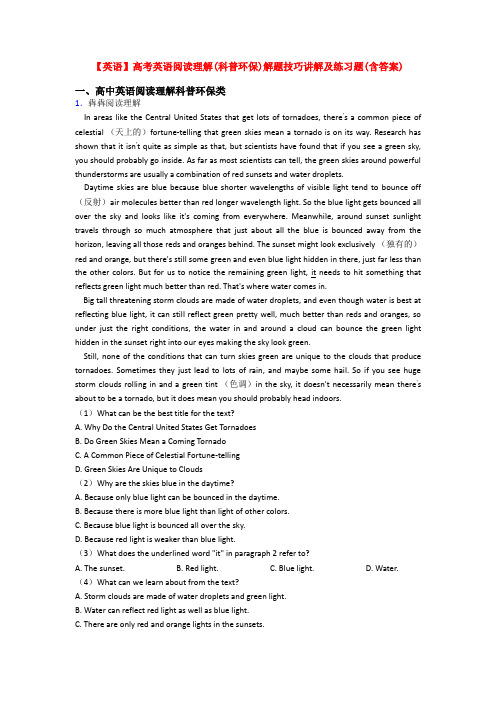
【英语】高考英语阅读理解(科普环保)解题技巧讲解及练习题(含答案)一、高中英语阅读理解科普环保类1.犇犇阅读理解In areas like the Central United States that get lots of tornadoes, there's a common piece of celestial (天上的)fortune-telling that green skies mean a tornado is on its way. Research has shown that it isn't quite as simple as that, but scientists have found that if you see a green sky, you should probably go inside. As far as most scientists can tell, the green skies around powerful thunderstorms are usually a combination of red sunsets and water droplets.Daytime skies are blue because blue shorter wavelengths of visible light tend to bounce off (反射)air molecules better than red longer wavelength light. So the blue light gets bounced all over the sky and looks like it's coming from everywhere. Meanwhile, around sunset sunlight travels through so much atmosphere that just about all the blue is bounced away from the horizon, leaving all those reds and oranges behind. The sunset might look exclusively (独有的)red and orange, but there's still some green and even blue light hidden in there, just far less than the other colors. But for us to notice the remaining green light, it needs to hit something that reflects green light much better than red. That's where water comes in.Big tall threatening storm clouds are made of water droplets, and even though water is best at reflecting blue light, it can still reflect green pretty well, much better than reds and oranges, so under just the right conditions, the water in and around a cloud can bounce the green light hidden in the sunset right into our eyes making the sky look green.Still, none of the conditions that can turn skies green are unique to the clouds that produce tornadoes. Sometimes they just lead to lots of rain, and maybe some hail. So if you see huge storm clouds rolling in and a green tint (色调)in the sky, it doesn't necessarily mean there's about to be a tornado, but it does mean you should probably head indoors.(1)What can be the best title for the text?A. Why Do the Central United States Get TornadoesB. Do Green Skies Mean a Coming TornadoC. A Common Piece of Celestial Fortune-tellingD. Green Skies Are Unique to Clouds(2)Why are the skies blue in the daytime?A. Because only blue light can be bounced in the daytime.B. Because there is more blue light than light of other colors.C. Because blue light is bounced all over the sky.D. Because red light is weaker than blue light.(3)What does the underlined word "it" in paragraph 2 refer to?A. The sunset.B. Red light.C. Blue light.D. Water.(4)What can we learn about from the text?A. Storm clouds are made of water droplets and green light.B. Water can reflect red light as well as blue light.C. There are only red and orange lights in the sunsets.D. If you see a green sky, there will be a tornado.【答案】(1)B(2)C(3)A(4)B【解析】【分析】本文是一篇说明文,科学家发现天空呈现绿色并不是产生龙卷风的云层所独有的,有时它们会导致大量降雨,甚至冰雹,待在室内或许是最好的选择。
高考英语阅读理解(科普环保)解题技巧及练习题(含答案)

高考英语阅读理解(科普环保)解题技巧及练习题(含答案)一、高中英语阅读理解科普环保类1.犇犇阅读下面文章,然后从题中所给的A、B、C、D四个选项中,选出每个问题的最佳选项。
When we see a person in trouble, the first idea that comes to our mind is to lend a hand. But what if we see an animal in trouble, does the same rule apply?This question was raised after a group of penguins were saved from an icy gully (峡谷) in Antarctica. It was filmed for the BBC wildlife series Dynasties. The film crew were anxious when they saw that a group of penguins had fallen into a gully and been trapped with their young. They built a slope (斜坡) so that a few of the penguins could save themselves.The case has taken the international media by storm. Viewers watching this film let out a sighof relief. "I'm so glad. I understand not taking action directly, but a helping hand isn't bothering, right?" viewer Kathryn Shaw said on her Facebook.However, others think human interference (干涉) is unnatural. "You can't have sunshine throughout your life. To have done anything else would only make matters worse," said the show's creator David Attenborough, according to The Times.In this case, however, Mike Gunton, the executive producer of the series, said that this was a one-off situation. "There were no animals going to suffer by interfering. You weren't touching the animals and it was just felt by doing this... they had the chance not to have to keep slipping downthe slope," he told the BBC.Such cases are familiar to Paul Nicklen, wildlife photographer for National Geographic. He told Metro, "If it's ever a predator (捕食者) situation, no matter how gut-wrenching, you stay out ofthe way. Even when you're watching a male polar bear eat a baby bear.""There's no rule book in those situations. You can only respond to the facts that are right therein front of you," Will Lawson, the show's director, told Daily Mail.(1)What has led to a heated media discussion?A.People's various remarks on penguins.B.The rescue of penguins from a gully.C.Some penguins' sufferings in a gully.D.Ways of filming the series Dynasties.(2)Who holds a positive attitude towards human interference?A.Kathryn Shaw.B.Will Lawson.C.Paul Nieklen.D.David Attenborough.(3)Which of the following best explains the word "gut-wrenching" underlined in paragraph 6?A.Putting one in place.B.Making one confused.C.Putting one in danger.D.Making one heartbroken.(4)What can be a suitable title for the text?A.Reasons for the Necessity of Lending a Hand to AnimalsB.Suggestions on How to Protect Animals From DangerC.Effects of Human Interference on Dangerous AnimalsD.Opinions on Whether to Help Animals in Trouble or Not【答案】(1)B(2)A(3)D(4)B【解析】【分析】本文是一篇说明文,介绍了当动物们面临危险时,我们是否要伸出援救之手,以及如何去保护它们脱险。
高考英语阅读理解(科普环保)的技巧及练习题及练习题(含答案)
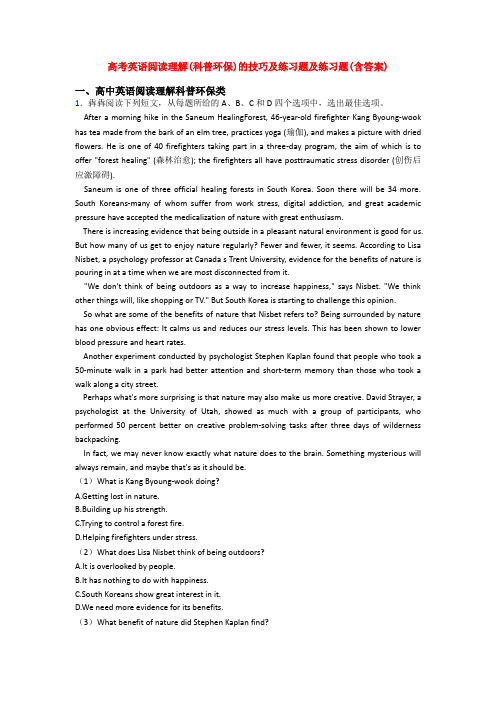
高考英语阅读理解(科普环保)的技巧及练习题及练习题(含答案)一、高中英语阅读理解科普环保类1.犇犇阅读下列短文,从每题所给的A、B、C和D四个选项中,选出最佳选项。
After a morning hike in the Saneum HealingForest, 46-year-old firefighter Kang Byoung-wook has tea made from the bark of an elm tree, practices yoga (瑜伽), and makes a picture with dried flowers. He is one of 40 firefighters taking part in a three-day program, the aim of which is to offer "forest healing" (森林治愈); the firefighters all have posttraumatic stress disorder (创伤后应激障碍).Saneum is one of three official healing forests in South Korea. Soon there will be 34 more. South Koreans-many of whom suffer from work stress, digital addiction, and great academic pressure have accepted the medicalization of nature with great enthusiasm.There is increasing evidence that being outside in a pleasant natural environment is good for us. But how many of us get to enjoy nature regularly? Fewer and fewer, it seems. According to Lisa Nisbet, a psychology professor at Canada s Trent University, evidence for the benefits of nature is pouring in at a time when we are most disconnected from it."We don't think of being outdoors as a way to increase happiness," says Nisbet. "We think other things will, like shopping or TV." But South Korea is starting to challenge this opinion.So what are some of the benefits of nature that Nisbet refers to? Being surrounded by nature has one obvious effect: It calms us and reduces our stress levels. This has been shown to lower blood pressure and heart rates.Another experiment conducted by psychologist Stephen Kaplan found that people who took a 50-minute walk in a park had better attention and short-term memory than those who took a walk along a city street.Perhaps what's more surprising is that nature may also make us more creative. David Strayer, a psychologist at the University of Utah, showed as much with a group of participants, who performed 50 percent better on creative problem-solving tasks after three days of wilderness backpacking.In fact, we may never know exactly what nature does to the brain. Something mysterious will always remain, and maybe that's as it should be.(1)What is Kang Byoung-wook doing?A.Getting lost in nature.B.Building up his strength.C.Trying to control a forest fire.D.Helping firefighters under stress.(2)What does Lisa Nisbet think of being outdoors?A.It is overlooked by people.B.It has nothing to do with happiness.C.South Koreans show great interest in it.D.We need more evidence for its benefits.(3)What benefit of nature did Stephen Kaplan find?A.It affects people's feelings.B.It lowers the risks of diseases.C.It helps improve mental performance.D.It does more good than physical exercise.(4)What would be the best title for the text?A.Your life in forestsB.Your brain on natureC.The future of forest healingD.The benefits of a stress-free life【答案】(1)A(2)A(3)C(4)B【解析】【分析】本文是一篇说明文,由韩国患创伤后应激障碍的消防员接受森林治愈谈起,介绍了大自然对我们身心健康的益处。
【英语】高三英语阅读理解(科普环保)答题技巧及练习题(含答案)及解析
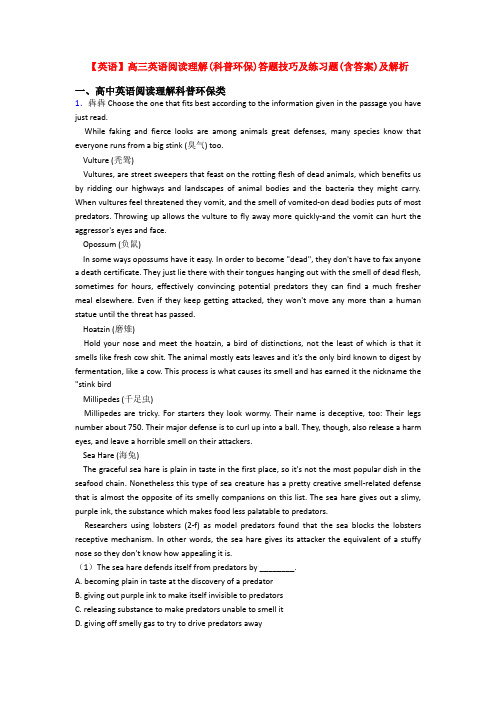
【英语】高三英语阅读理解(科普环保)答题技巧及练习题(含答案)及解析一、高中英语阅读理解科普环保类1.犇犇Choose the one that fits best according to the information given in the passage you have just read.While faking and fierce looks are among animals great defenses, many species know that everyone runs from a big stink (臭气) too.Vulture (秃鸳)Vultures, are street sweepers that feast on the rotting flesh of dead animals, which benefits us by ridding our highways and landscapes of animal bodies and the bacteria they might carry. When vultures feel threatened they vomit, and the smell of vomited-on dead bodies puts of most predators. Throwing up allows the vulture to fly away more quickly-and the vomit can hurt the aggressor's eyes and face.Opossum (负鼠)In some ways opossums have it easy. In order to become "dead", they don't have to fax anyone a death certificate. They just lie there with their tongues hanging out with the smell of dead flesh, sometimes for hours, effectively convincing potential predators they can find a much fresher meal elsewhere. Even if they keep getting attacked, they won't move any more than a human statue until the threat has passed.Hoatzin (磨雉)Hold your nose and meet the hoatzin, a bird of distinctions, not the least of which is that it smells like fresh cow shit. The animal mostly eats leaves and it's the only bird known to digest by fermentation, like a cow. This process is what causes its smell and has earned it the nickname the "stink birdMillipedes (千足虫)Millipedes are tricky. For starters they look wormy. Their name is deceptive, too: Their legs number about 750. Their major defense is to curl up into a ball. They, though, also release a harm eyes, and leave a horrible smell on their attackers.Sea Hare (海兔)The graceful sea hare is plain in taste in the first place, so it's not the most popular dish in the seafood chain. Nonetheless this type of sea creature has a pretty creative smell-related defense that is almost the opposite of its smelly companions on this list. The sea hare gives out a slimy, purple ink, the substance which makes food less palatable to predators.Researchers using lobsters (2-f) as model predators found that the sea blocks the lobsters receptive mechanism. In other words, the sea hare gives its attacker the equivalent of a stuffy nose so they don't know how appealing it is.(1)The sea hare defends itself from predators by ________.A. becoming plain in taste at the discovery of a predatorB. giving out purple ink to make itself invisible to predatorsC. releasing substance to make predators unable to smell itD. giving off smelly gas to try to drive predators away(2)Which of the following statements is TRUE according to the passage?A. The vulture carries bacteria so that predators dare not get close to it.B. The opossum fakes its death to avoid being targeted by predators.C. The hoatzin eats cow shit so that it is nick-named as "stink bird".D. The gas released by millipede was basically harmless.(3)The species that enjoys more than one defense mechanism is ________.A. vultureB. opossumC. millipedeD. sea hare【答案】(1)C(2)B(3)C【解析】【分析】本文是一篇说明文,介绍了一些野生动物是如何进行自身防御的。
(英语)高考英语阅读理解(科普环保)答题技巧及练习题(含答案)
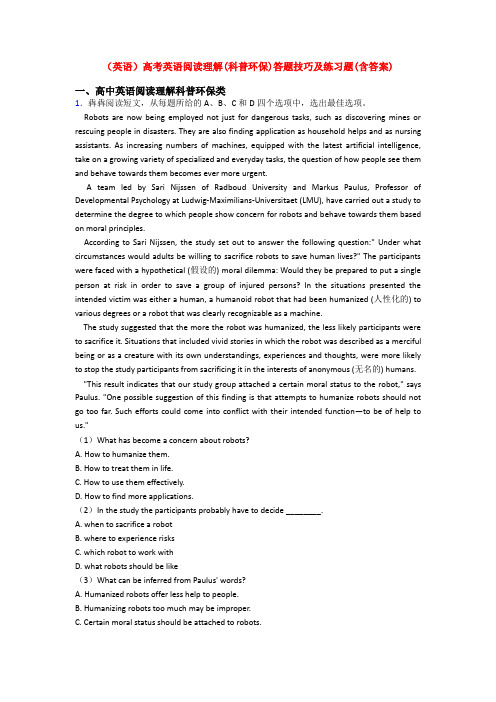
(英语)高考英语阅读理解(科普环保)答题技巧及练习题(含答案)一、高中英语阅读理解科普环保类1.犇犇阅读短文,从每题所给的A、B、C和D四个选项中,选出最佳选项。
Robots are now being employed not just for dangerous tasks, such as discovering mines or rescuing people in disasters. They are also finding application as household helps and as nursing assistants. As increasing numbers of machines, equipped with the latest artificial intelligence, take on a growing variety of specialized and everyday tasks, the question of how people see them and behave towards them becomes ever more urgent.A team led by Sari Nijssen of Radboud University and Markus Paulus, Professor of Developmental Psychology at Ludwig-Maximilians-Universitaet (LMU), have carried out a study to determine the degree to which people show concern for robots and behave towards them based on moral principles.According to Sari Nijssen, the study set out to answer the following question:" Under what circumstances would adults be willing to sacrifice robots to save human lives?" The participants were faced with a hypothetical (假设的) moral dilemma: Would they be prepared to put a single person at risk in order to save a group of injured persons? In the situations presented the intended victim was either a human, a humanoid robot that had been humanized (人性化的) to various degrees or a robot that was clearly recognizable as a machine.The study suggested that the more the robot was humanized, the less likely participants were to sacrifice it. Situations that included vivid stories in which the robot was described as a merciful being or as a creature with its own understandings, experiences and thoughts, were more likely to stop the study participants from sacrificing it in the interests of anonymous (无名的) humans. "This result indicates that our study group attached a certain moral status to the robot," says Paulus. "One possible suggestion of this finding is that attempts to humanize robots should not go too far. Such efforts could come into conflict with their intended function—to be of help to us."(1)What has become a concern about robots?A. How to humanize them.B. How to treat them in life.C. How to use them effectively.D. How to find more applications.(2)In the study the participants probably have to decide ________.A. when to sacrifice a robotB. where to experience risksC. which robot to work withD. what robots should be like(3)What can be inferred from Paulus' words?A. Humanized robots offer less help to people.B. Humanizing robots too much may be improper.C. Certain moral status should be attached to robots.D. Conflicts often happen between humans and robots.(4)Which of the following would be the best title for the text?A. Robots, A Must for FutureB. Humanized Robots, A New TrendC. Robot Saved, People Take the HitD. Humanized Robots, Replace Human【答案】(1)B(2)A(3)B(4)C【解析】【分析】本文是一篇说明文,随着越来越多的机器人具有人性化,它们承担越来越多样化的专业和日常任务,人们如何看待他们,如何对待他们的问题变的迫在眉睫。
(英语)高考英语阅读理解(科普环保)解题技巧和训练方法及练习题(含答案)
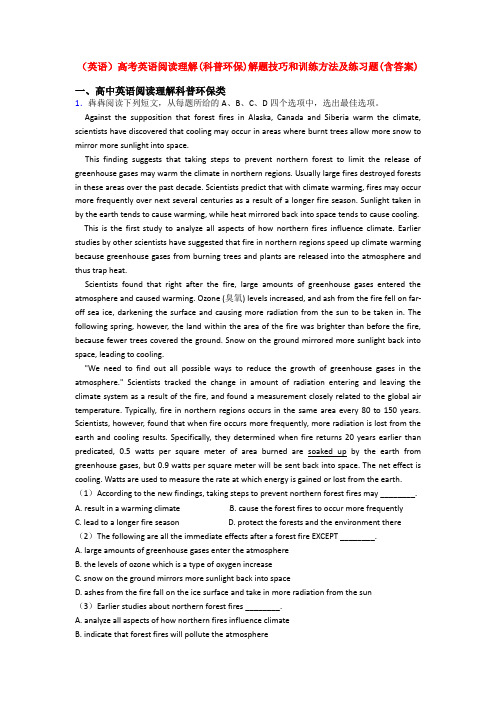
(英语)高考英语阅读理解(科普环保)解题技巧和训练方法及练习题(含答案)一、高中英语阅读理解科普环保类1.犇犇阅读下列短文,从每题所给的A、B、C、D四个选项中,选出最佳选项。
Against the supposition that forest fires in Alaska, Canada and Siberia warm the climate, scientists have discovered that cooling may occur in areas where burnt trees allow more snow to mirror more sunlight into space.This finding suggests that taking steps to prevent northern forest to limit the release of greenhouse gases may warm the climate in northern regions. Usually large fires destroyed forestsin these areas over the past decade. Scientists predict that with climate warming, fires may occur more frequently over next several centuries as a result of a longer fire season. Sunlight taken inby the earth tends to cause warming, while heat mirrored back into space tends to cause cooling.This is the first study to analyze all aspects of how northern fires influence climate. Earlier studies by other scientists have suggested that fire in northern regions speed up climate warming because greenhouse gases from burning trees and plants are released into the atmosphere and thus trap heat.Scientists found that right after the fire, large amounts of greenhouse gases entered the atmosphere and caused warming. Ozone (臭氧) levels increased, and ash from the fire fell on far-off sea ice, darkening the surface and causing more radiation from the sun to be taken in. The following spring, however, the land within the area of the fire was brighter than before the fire, because fewer trees covered the ground. Snow on the ground mirrored more sunlight back into space, leading to cooling."We need to find out all possible ways to reduce the growth of greenhouse gases in the atmosphere." Scientists tracked the change in amount of radiation entering and leaving the climate system as a result of the fire, and found a measurement closely related to the global air temperature. Typically, fire in northern regions occurs in the same area every 80 to 150 years. Scientists, however, found that when fire occurs more frequently, more radiation is lost from the earth and cooling results. Specifically, they determined when fire returns 20 years earlier than predicated, 0.5 watts per square meter of area burned are soaked up by the earth from greenhouse gases, but 0.9 watts per square meter will be sent back into space. The net effect is cooling. Watts are used to measure the rate at which energy is gained or lost from the earth.(1)According to the new findings, taking steps to prevent northern forest fires may ________.A. result in a warming climateB. cause the forest fires to occur more frequentlyC. lead to a longer fire seasonD. protect the forests and the environment there(2)The following are all the immediate effects after a forest fire EXCEPT ________.A. large amounts of greenhouse gases enter the atmosphereB. the levels of ozone which is a type of oxygen increaseC. snow on the ground mirrors more sunlight back into spaceD. ashes from the fire fall on the ice surface and take in more radiation from the sun(3)Earlier studies about northern forest fires ________.A. analyze all aspects of how northern fires influence climateB. indicate that forest fires will pollute the atmosphereC. suggest that people should take measures to protect the environmentD. suggest that the fires will speed up climate warming(4)The underlined phrase "soak up" in the last paragraph most probably means ________.A. releasedB. absorbedC. createdD. distributed(5)From the passage we can draw a conclusion that forest fires in Alaska, Canada and Siberia may ________.A. warm the climate as the supposition goesB. allow more snow to reflect more sunlight into space and thus cool the climateC. destroy large areas of forests and pollute the far-off sea iceD. help to gain more energy rather than release more energy【答案】(1)A(2)C(3)D(4)B(5)B【解析】【分析】本文是一篇说明文,介绍了阿拉斯加、加拿大和西伯利亚的森林大火使气候变暖,科学家们已经发现,在燃烧的树木允许更多的雪将更多的阳光反射到太空的地区可能会发生冷却。
(英语)高考英语阅读理解(科普环保)技巧(很有用)及练习题
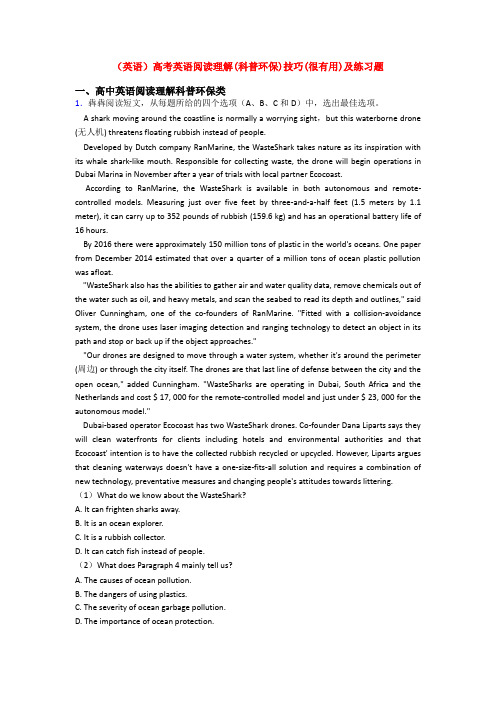
(英语)高考英语阅读理解(科普环保)技巧(很有用)及练习题一、高中英语阅读理解科普环保类1.犇犇阅读短文,从每题所给的四个选项(A、B、C和D)中,选出最佳选项。
A shark moving around the coastline is normally a worrying sight,but this waterborne drone (无人机) threatens floating rubbish instead of people.Developed by Dutch company RanMarine, the WasteShark takes nature as its inspiration with its whale shark-like mouth. Responsible for collecting waste, the drone will begin operations in Dubai Marina in November after a year of trials with local partner Ecocoast.According to RanMarine, the WasteShark is available in both autonomous and remote-controlled models. Measuring just over five feet by three-and-a-half feet (1.5 meters by 1.1 meter), it can carry up to 352 pounds of rubbish (159.6 kg) and has an operational battery life of 16 hours.By 2016 there were approximately 150 million tons of plastic in the world's oceans. One paper from December 2014 estimated that over a quarter of a million tons of ocean plastic pollution was afloat."WasteShark also has the abilities to gather air and water quality data, remove chemicals out of the water such as oil, and heavy metals, and scan the seabed to read its depth and outlines," said Oliver Cunningham, one of the co-founders of RanMarine. "Fitted with a collision-avoidance system, the drone uses laser imaging detection and ranging technology to detect an object in its path and stop or back up if the object approaches.""Our drones are designed to move through a water system, whether it's around the perimeter (周边) or through the city itself. The drones are that last line of defense between the city and the open ocean," added Cunningham. "WasteSharks are operating in Dubai, South Africa and the Netherlands and cost $ 17, 000 for the remote-controlled model and just under $ 23, 000 for the autonomous model."Dubai-based operator Ecocoast has two WasteShark drones. Co-founder Dana Liparts says they will clean waterfronts for clients including hotels and environmental authorities and that Ecocoast' intention is to have the collected rubbish recycled or upcycled. However, Liparts argues that cleaning waterways doesn't have a one-size-fits-all solution and requires a combination of new technology, preventative measures and changing people's attitudes towards littering.(1)What do we know about the WasteShark?A. It can frighten sharks away.B. It is an ocean explorer.C. It is a rubbish collector.D. It can catch fish instead of people.(2)What does Paragraph 4 mainly tell us?A. The causes of ocean pollution.B. The dangers of using plastics.C. The severity of ocean garbage pollution.D. The importance of ocean protection.(3)What will the WasteShark do with an approaching object?A. Avoid crashing into it.B. Break it into pieces.C. Swallow it.D. Fly over it.(4)Which of the following ideas does Liparts agree with?A. The WasteShark should be used more widely.B. More measures should be taken to make water clean.C. The production cost of WasteSharks should be reduced.D. People should take a positive attitude to new technology.【答案】(1)C(2)C(3)A(4)B【解析】【分析】本文是一篇说明文,介绍一种水上无人机可以用于清理浮在水面上的垃圾。
高考英语阅读理解(科普环保)技巧和方法完整版及练习题
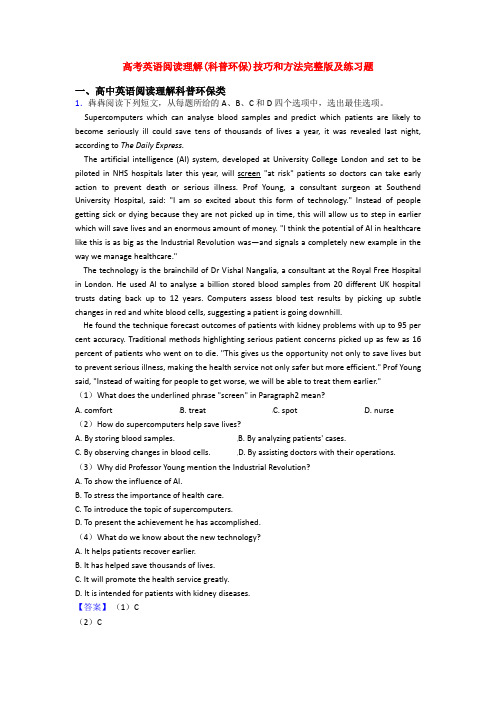
高考英语阅读理解(科普环保)技巧和方法完整版及练习题一、高中英语阅读理解科普环保类1.犇犇阅读下列短文,从每题所给的A、B、C和D四个选项中,选出最佳选项。
Supercomputers which can analyse blood samples and predict which patients are likely to become seriously ill could save tens of thousands of lives a year, it was revealed last night, according to The Daily Express.The artificial intelligence (AI) system, developed at University College London and set to be piloted in NHS hospitals later this year, will screen "at risk" patients so doctors can take early action to prevent death or serious illness. Prof Young, a consultant surgeon at Southend University Hospital, said: "I am so excited about this form of technology." Instead of people getting sick or dying because they are not picked up in time, this will allow us to step in earlier which will save lives and an enormous amount of money. "I think the potential of AI in healthcare like this is as big as the Industrial Revolution was—and signals a completely new example in the way we manage healthcare."The technology is the brainchild of Dr Vishal Nangalia, a consultant at the Royal Free Hospital in London. He used AI to analyse a billion stored blood samples from 20 different UK hospital trusts dating back up to 12 years. Computers assess blood test results by picking up subtle changes in red and white blood cells, suggesting a patient is going downhill.He found the technique forecast outcomes of patients with kidney problems with up to 95 per cent accuracy. Traditional methods highlighting serious patient concerns picked up as few as 16 percent of patients who went on to die. "This gives us the opportunity not only to save lives but to prevent serious illness, making the health service not only safer but more efficient." Prof Young said, "Instead of waiting for people to get worse, we will be able to treat them earlier."(1)What does the underlined phrase "screen" in Paragraph2 mean?A. comfortB. treatC. spotD. nurse(2)How do supercomputers help save lives?A. By storing blood samples.B. By analyzing patients' cases.C. By observing changes in blood cells.D. By assisting doctors with their operations.(3)Why did Professor Young mention the Industrial Revolution?A. To show the influence of AI.B. To stress the importance of health care.C. To introduce the topic of supercomputers.D. To present the achievement he has accomplished.(4)What do we know about the new technology?A. It helps patients recover earlier.B. It has helped save thousands of lives.C. It will promote the health service greatly.D. It is intended for patients with kidney diseases.【答案】(1)C(2)C(3)A(4)C【解析】【分析】本文是一篇说明文,介绍超级计算机能够分析血样并预测哪些病人可能会患上重病,每年可以挽救数万人的生命。
高考英语阅读理解(科普环保)技巧和方法完整版及练习题
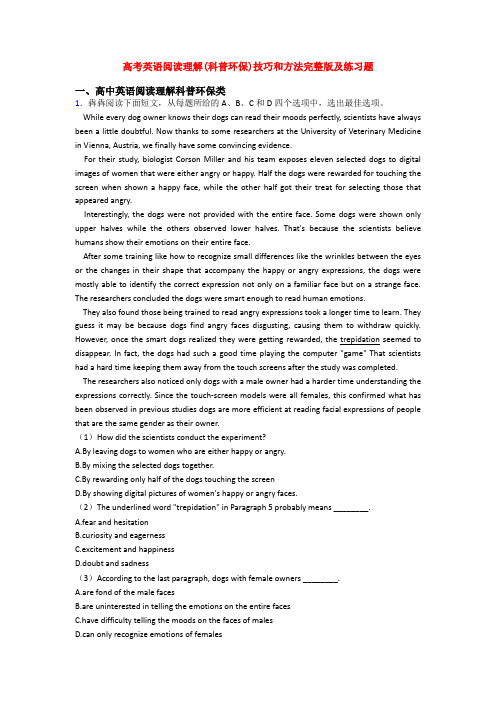
高考英语阅读理解(科普环保)技巧和方法完整版及练习题一、高中英语阅读理解科普环保类1.犇犇阅读下面短文,从每题所给的A、B、C和D四个选项中,选出最佳选项。
While every dog owner knows their dogs can read their moods perfectly, scientists have always been a little doubtful. Now thanks to some researchers at the University of Veterinary Medicine in Vienna, Austria, we finally have some convincing evidence.For their study, biologist Corson Miller and his team exposes eleven selected dogs to digital images of women that were either angry or happy. Half the dogs were rewarded for touching the screen when shown a happy face, while the other half got their treat for selecting those that appeared angry.Interestingly, the dogs were not provided with the entire face. Some dogs were shown only upper halves while the others observed lower halves. That's because the scientists believe humans show their emotions on their entire face.After some training like how to recognize small differences like the wrinkles between the eyes or the changes in their shape that accompany the happy or angry expressions, the dogs were mostly able to identify the correct expression not only on a familiar face but on a strange face. The researchers concluded the dogs were smart enough to read human emotions.They also found those being trained to read angry expressions took a longer time to learn. They guess it may be because dogs find angry faces disgusting, causing them to withdraw quickly. However, once the smart dogs realized they were getting rewarded, the trepidation seemed to disappear. In fact, the dogs had such a good time playing the computer "game" That scientists had a hard time keeping them away from the touch screens after the study was completed.The researchers also noticed only dogs with a male owner had a harder time understanding the expressions correctly. Since the touch-screen models were all females, this confirmed what has been observed in previous studies dogs are more efficient at reading facial expressions of people that are the same gender as their owner.(1)How did the scientists conduct the experiment?A.By leaving dogs to women who are either happy or angry.B.By mixing the selected dogs together.C.By rewarding only half of the dogs touching the screenD.By showing digital pictures of women's happy or angry faces.(2)The underlined word "trepidation" in Paragraph 5 probably means ________.A.fear and hesitationB.curiosity and eagernessC.excitement and happinessD.doubt and sadness(3)According to the last paragraph, dogs with female owners ________.A.are fond of the male facesB.are uninterested in telling the emotions on the entire facesC.have difficulty telling the moods on the faces of malesD.can only recognize emotions of females(4)What is the best title for this passage?A.Mood Changes Influence DogsB.Dogs Identify the MoodsC.dogs and Their OwnersD.Dog's Mood Research【答案】(1)D(2)A(3)C(4)B【解析】【分析】本文是一篇说明文,最新的实验发现,即狗能够识别人的面部表情的变化。
高三英语阅读理解(科普环保)解题技巧和训练方法及练习题(含答案)及解析

高三英语阅读理解(科普环保)解题技巧和训练方法及练习题(含答案)及解析一、高中英语阅读理解科普环保类1.犇犇阅读下列短文,从每题所给的A、B、C、D四个选项中,选出最佳选项。
Moving in with a boyfriend causes women to eat more unhealthily and put on weight. But the opposite is true for men, whose long-term health benefits when they move in with a female partner.Dieticians at Newcastle University said both partners try to please one another, and so change their dietary habits to suit their other half.It leads men to eat more light meals, such as salads, fruit and vegetables, while women choose to make creamier, heavier dishes curry or rich pasta sauces, which may please their partner. Women still have the strongest long-term influence over the couple's diet and lifestyle, as they still have the traditional role of shopper and cook in most households.The report, by Newcastle University's Human Nutrition Research Centre, reviewed the finding of a variety of research projects from the UK, North America and Australia, which looked at the eating and lifestyle habits of couples.The research shows that women are more likely to put on weight and increase their consumption of foods high in fat and sugar when they move in with their partnerWomen also use food as a comfort when dealing with emotional stress and have been found to gain weight when a relationship ends, while the same finding has not been observed in men.Many couples reported food as being central to their partnership, and eating together in the evening was particularly important to many.Report author and registered dietician Dr. Amelia Lake said, "The research has shown that your partner is a strong influence on lifestyle and people who are trying to live healthier lives should take this factor into consideration."(1)According to the passage, moving in with a girlfriend, men ________.A. have few changes of their dietary habitsB. have to eat more unhealthy foodsC. don't like foods high in fat and sugar at allD. try to eat foods that their girlfriends like(2)The underlined word "light" (in Paragraph 4) probably means ________.A. not very heavyB. less in fat and sugarC. gentleD. not serious or important (3)According to the report by Newcastle University's Human Nutrition Research Centre, ________.A. women put on weight only because they want to suit their other halfB. when men are faced with emotional stress, they will change their dietary habitsC. eating together in the evening is a good way to communicate for couplesD. it is wrong to change your dietary habits to suit your partner(4)From the passage, we can infer that ________.A. women should pay more attention to their partner's influence on themB. more men will play roles of shopper and cook in most householdsC. couples will not change their dietary habits and lifestyle to please their partnerD. long-term health of men benefits when they move in with a female partner(5)What would be the best title for the passage?A. Don't be silly any more, women!B. Which are better dietary habits?C. Boyfriends make you fatD. Dr. Amelia Lake and his study【答案】(1)D(2)B(3)C(4)A(5)C【解析】【分析】本文是一篇说明文,纽卡斯尔大学的营养学专家的研究表明,同居让女人发胖让男人更健康。
【英语】高考英语阅读理解(科普环保)解题技巧(超强)及练习题(含答案)
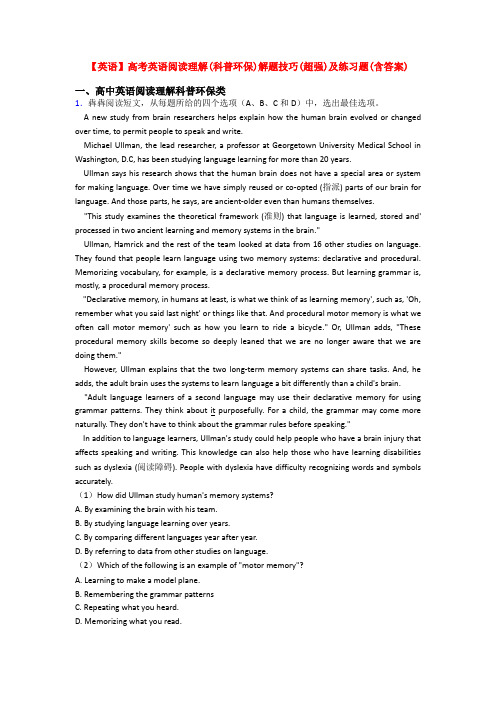
【英语】高考英语阅读理解(科普环保)解题技巧(超强)及练习题(含答案)一、高中英语阅读理解科普环保类1.犇犇阅读短文,从每题所给的四个选项(A、B、C和D)中,选出最佳选项。
A new study from brain researchers helps explain how the human brain evolved or changed over time, to permit people to speak and write.Michael Ullman, the lead researcher, a professor at Georgetown University Medical School in Washington, D.C, has been studying language learning for more than 20 years.Ullman says his research shows that the human brain does not have a special area or system for making language. Over time we have simply reused or co-opted (指派) parts of our brain for language. And those parts, he says, are ancient-older even than humans themselves."This study examines the theoretical framework (准则) that language is learned, stored and' processed in two ancient learning and memory systems in the brain."Ullman, Hamrick and the rest of the team looked at data from 16 other studies on language. They found that people learn language using two memory systems: declarative and procedural. Memorizing vocabulary, for example, is a declarative memory process. But learning grammar is, mostly, a procedural memory process."Declarative memory, in humans at least, is what we think of as learning memory', such as, 'Oh, remember what you said last night' or things like that. And procedural motor memory is what we often call motor memory' such as how you learn to ride a bicycle." Or, Ullman adds, "These procedural memory skills become so deeply leaned that we are no longer aware that we are doing them."However, Ullman explains that the two long-term memory systems can share tasks. And, he adds, the adult brain uses the systems to learn language a bit differently than a child's brain. "Adult language learners of a second language may use their declarative memory for using grammar patterns. They think about it purposefully. For a child, the grammar may come more naturally. They don't have to think about the grammar rules before speaking."In addition to language learners, Ullman's study could help people who have a brain injury that affects speaking and writing. This knowledge can also help those who have learning disabilities such as dyslexia (阅读障碍). People with dyslexia have difficulty recognizing words and symbols accurately.(1)How did Ullman study human's memory systems?A. By examining the brain with his team.B. By studying language learning over years.C. By comparing different languages year after year.D. By referring to data from other studies on language.(2)Which of the following is an example of "motor memory"?A. Learning to make a model plane.B. Remembering the grammar patternsC. Repeating what you heard.D. Memorizing what you read.(3)What does the underlined word "it" refer to?A. Declarative memory.B. An adult language learner.C. Using grammar patterns.D. A second language.(4)What's the main idea of the text?A. Ullman has advanced our language understanding.B. A new research helps people learn a new language.C. Learning memory is more active than motor memory.D. Human beings learn language in pre human area of brain.【答案】(1)D(2)A(3)C(4)D【解析】【分析】本文是一篇说明文,讲述Michael Ullman和他的团队的研究称人类大脑前区的为语言学习区,由此解开了人类大脑进化过程之谜。
【英语】高三英语阅读理解(科普环保)解题技巧分析及练习题(含答案)及解析

【英语】高三英语阅读理解(科普环保)解题技巧分析及练习题(含答案)及解析一、高中英语阅读理解科普环保类1.犇犇阅读下面文章,然后从题中所给的A、B、C、D四个选项中,选出每个问题的最佳选项。
When we see a person in trouble, the first idea that comes to our mind is to lend a hand. But what if we see an animal in trouble, does the same rule apply?This question was raised after a group of penguins were saved from an icy gully (峡谷) in Antarctica. It was filmed for the BBC wildlife series Dynasties. The film crew were anxious when they saw that a group of penguins had fallen into a gully and been trapped with their young. They built a slope (斜坡) so that a few of the penguins could save themselves.The case has taken the international media by storm. Viewers watching this film let out a sighof relief. "I'm so glad. I understand not taking action directly, but a helping hand isn't bothering, right?" viewer Kathryn Shaw said on her Facebook.However, others think human interference (干涉) is unnatural. "You can't have sunshine throughout your life. To have done anything else would only make matters worse," said the show's creator David Attenborough, according to The Times.In this case, however, Mike Gunton, the executive producer of the series, said that this was a one-off situation. "There were no animals going to suffer by interfering. You weren't touching the animals and it was just felt by doing this... they had the chance not to have to keep slipping downthe slope," he told the BBC.Such cases are familiar to Paul Nicklen, wildlife photographer for National Geographic. He told Metro, "If it's ever a predator (捕食者) situation, no matter how gut-wrenching, you stay out ofthe way. Even when you're watching a male polar bear eat a baby bear.""There's no rule book in those situations. You can only respond to the facts that are right therein front of you," Will Lawson, the show's director, told Daily Mail.(1)What has led to a heated media discussion?A.People's various remarks on penguins.B.The rescue of penguins from a gully.C.Some penguins' sufferings in a gully.D.Ways of filming the series Dynasties.(2)Who holds a positive attitude towards human interference?A.Kathryn Shaw.B.Will Lawson.C.Paul Nieklen.D.David Attenborough.(3)Which of the following best explains the word "gut-wrenching" underlined in paragraph 6?A.Putting one in place.B.Making one confused.C.Putting one in danger.D.Making one heartbroken.(4)What can be a suitable title for the text?A.Reasons for the Necessity of Lending a Hand to AnimalsB.Suggestions on How to Protect Animals From DangerC.Effects of Human Interference on Dangerous AnimalsD.Opinions on Whether to Help Animals in Trouble or Not【答案】(1)B(2)A(3)D(4)B【解析】【分析】本文是一篇说明文,介绍了当动物们面临危险时,我们是否要伸出援救之手,以及如何去保护它们脱险。
【英语】高三英语阅读理解(科普环保)及其解题技巧及练习题(含答案)含解析
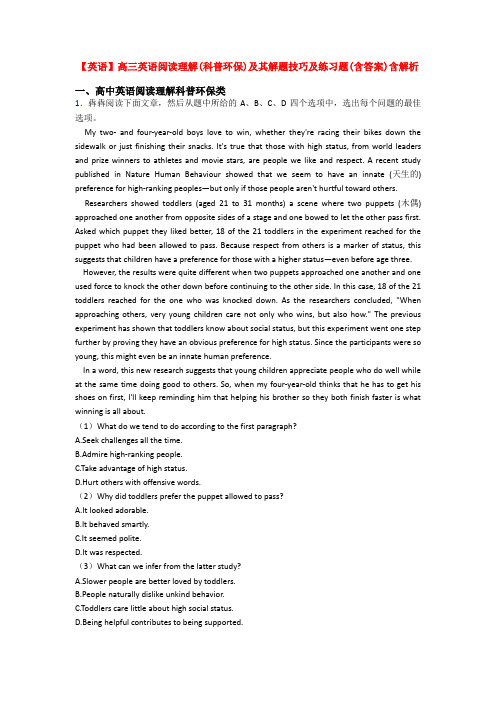
【英语】高三英语阅读理解(科普环保)及其解题技巧及练习题(含答案)含解析一、高中英语阅读理解科普环保类1.犇犇阅读下面文章,然后从题中所给的A、B、C、D四个选项中,选出每个问题的最佳选项。
My two- and four-year-old boys love to win, whether they're racing their bikes down the sidewalk or just finishing their snacks. It's true that those with high status, from world leaders and prize winners to athletes and movie stars, are people we like and respect. A recent study published in Nature Human Behaviour showed that we seem to have an innate (天生的) preference for high-ranking peoples—but only if those people aren't hurtful toward others.Researchers showed toddlers (aged 21 to 31 months) a scene where two puppets (木偶) approached one another from opposite sides of a stage and one bowed to let the other pass first. Asked which puppet they liked better, 18 of the 21 toddlers in the experiment reached for the puppet who had been allowed to pass. Because respect from others is a marker of status, this suggests that children have a preference for those with a higher status—even before age three. However, the results were quite different when two puppets approached one another and one used force to knock the other down before continuing to the other side. In this case, 18 of the 21 toddlers reached for the one who was knocked down. As the researchers concluded, "When approaching others, very young children care not only who wins, but also how." The previous experiment has shown that toddlers know about social status, but this experiment went one step further by proving they have an obvious preference for high status. Since the participants were so young, this might even be an innate human preference.In a word, this new research suggests that young children appreciate people who do well while at the same time doing good to others. So, when my four-year-old thinks that he has to get his shoes on first, I'll keep reminding him that helping his brother so they both finish faster is what winning is all about.(1)What do we tend to do according to the first paragraph?A.Seek challenges all the time.B.Admire high-ranking people.C.Take advantage of high status.D.Hurt others with offensive words.(2)Why did toddlers prefer the puppet allowed to pass?A.It looked adorable.B.It behaved smartly.C.It seemed polite.D.It was respected.(3)What can we infer from the latter study?A.Slower people are better loved by toddlers.B.People naturally dislike unkind behavior.C.Toddlers care little about high social status.D.Being helpful contributes to being supported.(4)What should we do when we encourage children to win?A.Instruct them to use proper and creative ways.B.Advise them to be as hardworking as possible.C.Remind them to be considerate to other people.D.Tell them to try to cooperate with someone else.【答案】(1)B(2)D(3)B(4)C【解析】【分析】本文是一篇说明文,介绍了人们更倾向于喜欢和尊敬地位高而又无害于他人的人,这似乎是一种天性,即使是蹒跚学步的孩子也是如此。
(英语)高考英语阅读理解(科普环保)解题技巧(超强)及练习题(含答案)
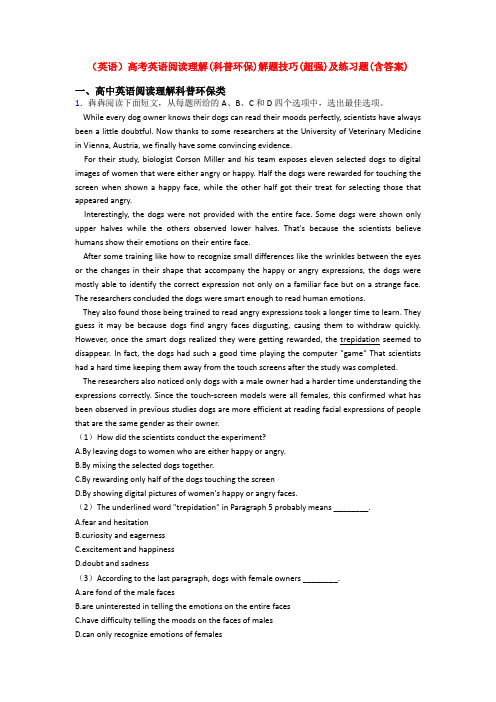
(英语)高考英语阅读理解(科普环保)解题技巧(超强)及练习题(含答案)一、高中英语阅读理解科普环保类1.犇犇阅读下面短文,从每题所给的A、B、C和D四个选项中,选出最佳选项。
While every dog owner knows their dogs can read their moods perfectly, scientists have always been a little doubtful. Now thanks to some researchers at the University of Veterinary Medicine in Vienna, Austria, we finally have some convincing evidence.For their study, biologist Corson Miller and his team exposes eleven selected dogs to digital images of women that were either angry or happy. Half the dogs were rewarded for touching the screen when shown a happy face, while the other half got their treat for selecting those that appeared angry.Interestingly, the dogs were not provided with the entire face. Some dogs were shown only upper halves while the others observed lower halves. That's because the scientists believe humans show their emotions on their entire face.After some training like how to recognize small differences like the wrinkles between the eyes or the changes in their shape that accompany the happy or angry expressions, the dogs were mostly able to identify the correct expression not only on a familiar face but on a strange face. The researchers concluded the dogs were smart enough to read human emotions.They also found those being trained to read angry expressions took a longer time to learn. They guess it may be because dogs find angry faces disgusting, causing them to withdraw quickly. However, once the smart dogs realized they were getting rewarded, the trepidation seemed to disappear. In fact, the dogs had such a good time playing the computer "game" That scientists had a hard time keeping them away from the touch screens after the study was completed.The researchers also noticed only dogs with a male owner had a harder time understanding the expressions correctly. Since the touch-screen models were all females, this confirmed what has been observed in previous studies dogs are more efficient at reading facial expressions of people that are the same gender as their owner.(1)How did the scientists conduct the experiment?A.By leaving dogs to women who are either happy or angry.B.By mixing the selected dogs together.C.By rewarding only half of the dogs touching the screenD.By showing digital pictures of women's happy or angry faces.(2)The underlined word "trepidation" in Paragraph 5 probably means ________.A.fear and hesitationB.curiosity and eagernessC.excitement and happinessD.doubt and sadness(3)According to the last paragraph, dogs with female owners ________.A.are fond of the male facesB.are uninterested in telling the emotions on the entire facesC.have difficulty telling the moods on the faces of malesD.can only recognize emotions of females(4)What is the best title for this passage?A.Mood Changes Influence DogsB.Dogs Identify the MoodsC.dogs and Their OwnersD.Dog's Mood Research【答案】(1)D(2)A(3)C(4)B【解析】【分析】本文是一篇说明文,最新的实验发现,即狗能够识别人的面部表情的变化。
- 1、下载文档前请自行甄别文档内容的完整性,平台不提供额外的编辑、内容补充、找答案等附加服务。
- 2、"仅部分预览"的文档,不可在线预览部分如存在完整性等问题,可反馈申请退款(可完整预览的文档不适用该条件!)。
- 3、如文档侵犯您的权益,请联系客服反馈,我们会尽快为您处理(人工客服工作时间:9:00-18:30)。
【英语】高考英语阅读理解(科普环保)技巧(很有用)及练习题一、高中英语阅读理解科普环保类1.犇犇阅读理解Kaitlin Woolley and Ayelet Fishbach report in Psychological Science that a meal taken "family-style" from a central plate can greatly improve the outcome of later negotiations.Having conducted previous research in 2017 revealing that eating similar foods led to people feeling emotionally closer to one another, Dr Woolley and Dr Fishbach wondered whether the way in which food was served also had a psychological effect. They theorized that, on the one hand, sharing food with other people might indicate food scarcity(短缺)and increase a feeling of competition. However, they also reasoned that it could instead lead people to become more aware of others' needs and drive cooperative behavior as a result. Curious to find out, they did a series of experiments.For the first test they recruited 100 pairs of participants from a local cafe, none of whom knew each other. The participants were seated at a table and fed tortilla chips with salsa. Half the pairs were given their own basket of 20 grams of chips and a bowl of 25 grams of salsa, and half were given 40 grams of chips and 50 grams of salsa to share. As a cover for the experiment, all participants were told this snack was to be consumed before the game began.The game asked the participants to negotiate an hourly wage rate during a fictional strike. Each person was randomly assigned to represent the union or management and follow a set of rules. The researchers measured cooperation by noting the number of rounds it took to reach an agreement, and found that those who shared food resolved the strike significantly faster(in 8. 7rounds)than those who did not(13.2 rounds). A similar experiment was conducted with 104participants and Goldfish crackers(饼干), this time negotiating an airline's route prices. The results were much the same, with the food-sharers negotiating successfully 63. 3%of the time and those who did not share doing so 42. 9%of the time.(1)What does the "family-style" meal in the report refer to?A. A meal taken at home.B. A meal shared with others.C. A meal consumed by oneself.D. A meal taken in a family atmosphere.(2)For what purpose did the researchers carry out the present experiments?A. To show the way food is served.B. To prove sharing food increases competition.C. To confirm sharing food can promote cooperation.D. To find out whether sharing food can get people close emotionally.(3)Why were participants asked to eat up the snack before the game?A. To add to their energy.B. To reward them for their participation.C. To hide the intention of the experiment.D. To avoid the distraction during the game.【答案】(1)B(2)C(3)C【解析】【分析】本文是一篇说明文,介绍了外交宴席的心理学,研究表明,从中间菜采取的“家庭式”餐,可以大大改善后续谈判的结果。
(1)考查细节理解。
根据第二段中的“They theorized that, on the one hand, sharing food with other people might indicate food scarcity(短缺)and increase a feeling of competition. However, they also reasoned that it could instead lead people to become more aware of others' needs and drive cooperative behavior as a result.”他们形成了一套理论,认为一方面,与他人一起吃饭可能表明粮食短缺,并加强了竞争的概念。
然而,他们还推断,这种方式可能会导致人们更加了解他人的需求,从而推动合作性的行为。
可知family-style指的是与别人一起用餐,故选B。
(2)考查细节理解。
根据第二段中的“However, they also reasoned that it could instead lead people to become more aware of others' needs and drive cooperative behavior as a result. Curious to find out, they did a series of experiments.”然而,他们还推断,这种方式可能会导致人们更加了解他人的需求,从而推动合作性的行为。
出于好奇心,他们做了一系列实验。
可知选C。
(3)考查细节理解。
根据第三段中的“As a cover for the experiment, all participants were told this snack was to be consumed before the game began.”作为实验的掩护,所有受试者都得告在游戏开始前就要吃完这些零食。
可知选C。
【点评】本题考点涉及细节理解题型的考查,是一篇科研类阅读,考生需要准确掌握细节信息,并结合题目要求,从而选出正确答案。
2.犇犇阅读理解In our twenties, we find it funny when we can't remember our neighbor's cat's name or a handsome actor who starred in a famous movie. In our thirties, we jokingly call it "brain freeze". In our forties, we laugh it off as a" senior moment" and follow up with one of these old age jokes. But the reality is that there comes a point when being forgetful stops being funny and starts to seem a bit dreadful. You think, "Am I losing it?"Or worse, "Is this a sign of Alzheimer's disease (老年痴呆症)?"Well, don't worry. The fact that you recognize your own forgetfulness may be a very good sign, at least in terms of the possibility of your developing Alzheimer's disease(AD). The researchers in a new study show that it's not forgetfulness but not being aware that we're forgetful that we should fear.The researchers began with the assumption that one common feature of Alzheimer's dis-ease is a damaged awareness of illness. And they wanted to prove their theory that the lack of awareness can be used to predict whether someone with" mild cognitive(认知的)damage" will progress to full-on AD. For the study, "mild cognitive damage" was defined as someone whose mental state was considered healthy but who had either complained of memory loss or had suffered objective memory loss.The researchers used existing data for 1, 062 people between the ages of 55 and 90 that had been recorded over a 12-year period. The data included brain scans, which the researchers used to look for visual signs of reduced glucose uptake(葡萄糖吸收).It is an objective marker of thesort of reduced brain function that goes along with AD.As expected, glucose uptake was reduced in those with AD. What the researchers also discovered was that glucose uptake was reduced in those with mild cognitive damage who also showed evidence of reduced illness awareness. Finally, the researchers found that those who had reduced illness awareness were more likely to develop AD than those without.(1)What can be implied from paragraph 1?A. People can be forgetful at different ages.B. The memory of the young is better than the old.C. Old people are most afraid of getting Alzheimer's disease.D. It's a rare phenomenon when young people forget something.(2)What statement does the researchers in the new study agree with?A. Being aware all the time is a fearful thing.B. Illness awareness has nothing to do with Alzheimer's disease.C. Recognizing forgetfulness doesn't mean developing Alzheimer's disease.D. Realizing forgetfulness must be a sign of developing Alzheimer's disease.(3)What can be a sign of developing Alzheimer's disease?A. Realizing others' forgetfulness.B. Reduced uptake of glucose.C. Having higher intake of glucose.D. Expected increase in brain function.(4)From which is the text probably taken?A. Science fiction.B. A chemistry book.C. A science research.D. A health brochure.【答案】(1)A(2)C(3)B(4)C【解析】【分析】本文是一篇说明文,介绍了如何预测你的记忆丧失是否是老年痴呆症, 一项新的研究表明,不是遗忘,而是没有意识到我们的健忘让人们感到害怕。
